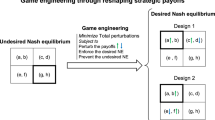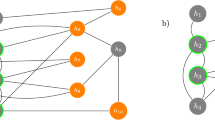Abstract
The set of all Nash equilibria of a non-cooperative game with more than two players is defined by equations and inequalities between nonlinear polynomials, which makes it challenging to compute. This paper presents an algorithm that computes this set for the simplest game with more than two players with arbitrary (possibly non-generic) payoffs, which has not been done before. We give new elegant formulas for completely mixed equilibria, and compute visual representations of the best-response correspondences and their intersections, which define the Nash equilibrium set. These have been implemented in Python and will be part of a public web-based software for automated equilibrium analysis. For small games, which are often studied in economic models, a complete Nash equilibrium analysis is desirable and should be feasible. This project demonstrates the difficulties of this task and offers pathways for extensions to larger games.
Access this chapter
Tax calculation will be finalised at checkout
Purchases are for personal use only
Similar content being viewed by others
References
Avis, D., Rosenberg, G.D., Savani, R., von Stengel, B.: Enumeration of Nash equilibria for two-player games. Econ. Theor. 42(1), 9–37 (2010)
Cai, Y., Candogan, O., Daskalakis, C., Papadimitriou, C.: Zero-sum polymatrix games: a generalization of minmax. Math. Oper. Res. 41(2), 648–655 (2016)
Chen, X., Deng, X., Teng, S.H.: Settling the complexity of computing two-player Nash equilibria. J. ACM 56(3), Article 14 (2009)
Chin, H., Parthasarathy, T., Raghavan, T.: Structure of equilibria in N-person non-cooperative games. Internat. J. Game Theory 3(1), 1–19 (1974)
Daskalakis, C., Goldberg, P.W., Papadimitriou, C.H.: The complexity of computing a Nash equilibrium. SIAM J. Comput. 39(1), 195–259 (2009)
Datta, R.S.: Finding all Nash equilibria of a finite game using polynomial algebra. Econ. Theor. 42(1), 55–96 (2010)
Govindan, S., Wilson, R.: Computing Nash equilibria by iterated polymatrix approximation. J. Econ. Dyn. Control 28(7), 1229–1241 (2004)
Howson, J.T., Jr.: Equilibria of polymatrix games. Manag. Sci. 18(5, Part I), 312–318 (1972)
McKelvey, R.D., McLennan, A.: The maximal number of regular totally mixed Nash equilibria. J. Econ. Theory 72(2), 411–425 (1997)
McKelvey, R.D., McLennan, A.M., Turocy, T.L.: Gambit: software tools for game theory, version 16.0.1 (2016). http://www.gambit-project.org
Nash, J.: Non-cooperative games. Ann. Math. 54(2), 286–295 (1951)
Selten, R.: Reexamination of the perfectness concept for equilibrium points in extensive games. Internat. J. Game Theory 4(1), 25–55 (1975)
von Stengel, B.: Game Theory Basics. Cambridge University Press, Cambridge (2022)
Winkels, H.M.: An algorithm to determine all equilibrium points of a bimatrix game. In: Moeschlin, O., Pallaschke, D. (eds.) Game Theory and Related Topics, North-Holland, Amsterdam, pp. 137–148 (1979)
Acknowledgements
We thank the anonymous referees for helpful comments.
Author information
Authors and Affiliations
Corresponding author
Editor information
Editors and Affiliations
Rights and permissions
Copyright information
© 2022 The Author(s), under exclusive license to Springer Nature Switzerland AG
About this paper
Cite this paper
Jahani, S., von Stengel, B. (2022). Automated Equilibrium Analysis of \(2\times 2\times 2\) Games. In: Kanellopoulos, P., Kyropoulou, M., Voudouris, A. (eds) Algorithmic Game Theory. SAGT 2022. Lecture Notes in Computer Science, vol 13584. Springer, Cham. https://doi.org/10.1007/978-3-031-15714-1_13
Download citation
DOI: https://doi.org/10.1007/978-3-031-15714-1_13
Published:
Publisher Name: Springer, Cham
Print ISBN: 978-3-031-15713-4
Online ISBN: 978-3-031-15714-1
eBook Packages: Computer ScienceComputer Science (R0)




